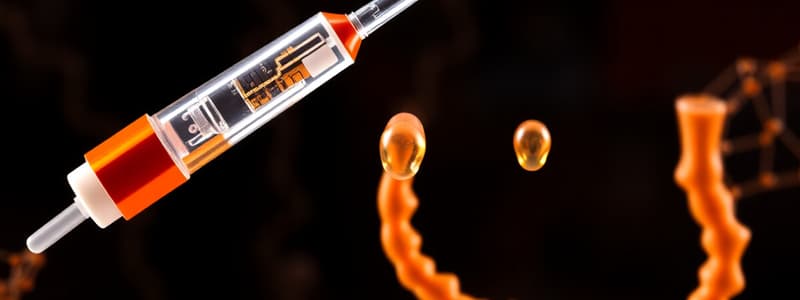Podcast
Questions and Answers
What is one of the triggers for the secretion of glucagon from the pancreas?
What is one of the triggers for the secretion of glucagon from the pancreas?
- Increased blood glucose levels
- Decreased blood glucose levels (correct)
- Increased levels of insulin
- High fatty acid levels
Which amino acid is specifically mentioned as a trigger for glucagon secretion?
Which amino acid is specifically mentioned as a trigger for glucagon secretion?
- Serine
- Glycine
- Alanine (correct)
- Leucine
With which type of hormones does glucagon secretion correlate?
With which type of hormones does glucagon secretion correlate?
- Thyroid hormones
- Adrenal hormones
- Gut hormones (correct)
- Pituitary hormones
What effect does insulin have on glucose oxidation in body cells?
What effect does insulin have on glucose oxidation in body cells?
What role does glucagon play in the body during fasting?
What role does glucagon play in the body during fasting?
Which process is decreased in the liver as a result of insulin activity?
Which process is decreased in the liver as a result of insulin activity?
Which of the following is NOT a known trigger for glucagon secretion?
Which of the following is NOT a known trigger for glucagon secretion?
What is the primary effect of insulin on glycogen in skeletal muscle?
What is the primary effect of insulin on glycogen in skeletal muscle?
What is the primary effect of insulin on glycogen in the liver?
What is the primary effect of insulin on glycogen in the liver?
Which of the following processes is associated with the action of insulin in the liver?
Which of the following processes is associated with the action of insulin in the liver?
Which of the following processes is inhibited by insulin?
Which of the following processes is inhibited by insulin?
How does insulin affect fat storage in the body?
How does insulin affect fat storage in the body?
In the context of insulin's effects on the liver, which process relates to the production of glucose?
In the context of insulin's effects on the liver, which process relates to the production of glucose?
Which statement accurately describes the regulation of pancreatic hormones?
Which statement accurately describes the regulation of pancreatic hormones?
What effect do gastric inhibiting peptide (GIP), gastrin, and cholecystokinin have on insulin release?
What effect do gastric inhibiting peptide (GIP), gastrin, and cholecystokinin have on insulin release?
What role does insulin play in ketogenesis?
What role does insulin play in ketogenesis?
What role do glucose transporters (GLUT) play in cellular metabolism?
What role do glucose transporters (GLUT) play in cellular metabolism?
In which way does insulin affect the metabolism of lipids?
In which way does insulin affect the metabolism of lipids?
Why does oral glucose stimulate insulin release more effectively than intravenous glucose?
Why does oral glucose stimulate insulin release more effectively than intravenous glucose?
Which gut hormone is NOT involved in increasing insulin release?
Which gut hormone is NOT involved in increasing insulin release?
How does glucose enter cells according to the provided information?
How does glucose enter cells according to the provided information?
What common characteristic do GIP, gastrin, and cholecystokinin share in their function related to insulin?
What common characteristic do GIP, gastrin, and cholecystokinin share in their function related to insulin?
What is the primary mechanism that glucose transporters use to function?
What is the primary mechanism that glucose transporters use to function?
Which physiological process explains why oral glucose has a stronger effect on insulin release than intravenous glucose?
Which physiological process explains why oral glucose has a stronger effect on insulin release than intravenous glucose?
Which characteristic is true about glucose transport mechanisms?
Which characteristic is true about glucose transport mechanisms?
Flashcards are hidden until you start studying
Study Notes
Pancreatic Hormones
- Pancreatic hormones are not controlled by the pituitary gland.
- Insulin is a hormone produced by the pancreas.
- Glucose enters cells through facilitated diffusion.
- Glucose transporters, or GLUT, move glucose down its concentration gradient from the extracellular fluid (ECF) into the cell.
- This process does not require energy.
- Gut hormones, including gastric inhibiting peptide (GIP), gastrin, and cholecystokinin, can increase insulin release.
- Oral glucose stimulates insulin release more effectively than intravenous glucose.
- Insulin enhances glucose oxidation within body cells.
- Within the liver, insulin promotes glycogen synthesis and reduces glycogenolysis and gluconeogenesis.
- Within skeletal muscle, insulin increases glycogenesis.
- Insulin promotes lipid (fat) storage in adipose tissue cells and the liver.
- Insulin inhibits lipolysis and ketogenesis.
Glucagon
- Glucagon is secreted by alpha cells in the pancreas.
- Glucagon is released in response to decreased blood glucose levels, such as during fasting.
- Glucagon is also triggered by certain amino acids, like alanine.
- Gut hormones, including CCK, gastrin, and GIP, also stimulate glucagon release.
Studying That Suits You
Use AI to generate personalized quizzes and flashcards to suit your learning preferences.




